The Second Sex Theory
VerifiedAdded on 2023/03/30
|9
|2484
|361
AI Summary
This essay explores the relevance of Simone de Beauvoir's 'The Second Sex' in today's society and its impact on feminism. It discusses the themes of oppression, gender roles, and discrimination faced by women. The essay also highlights the importance of the book in psychotherapy and its representation of women in literature. The relevance of 'The Second Sex' in contemporary feminism is examined, along with its regional significance in the Norwegian intellectual female society.
Contribute Materials
Your contribution can guide someone’s learning journey. Share your
documents today.
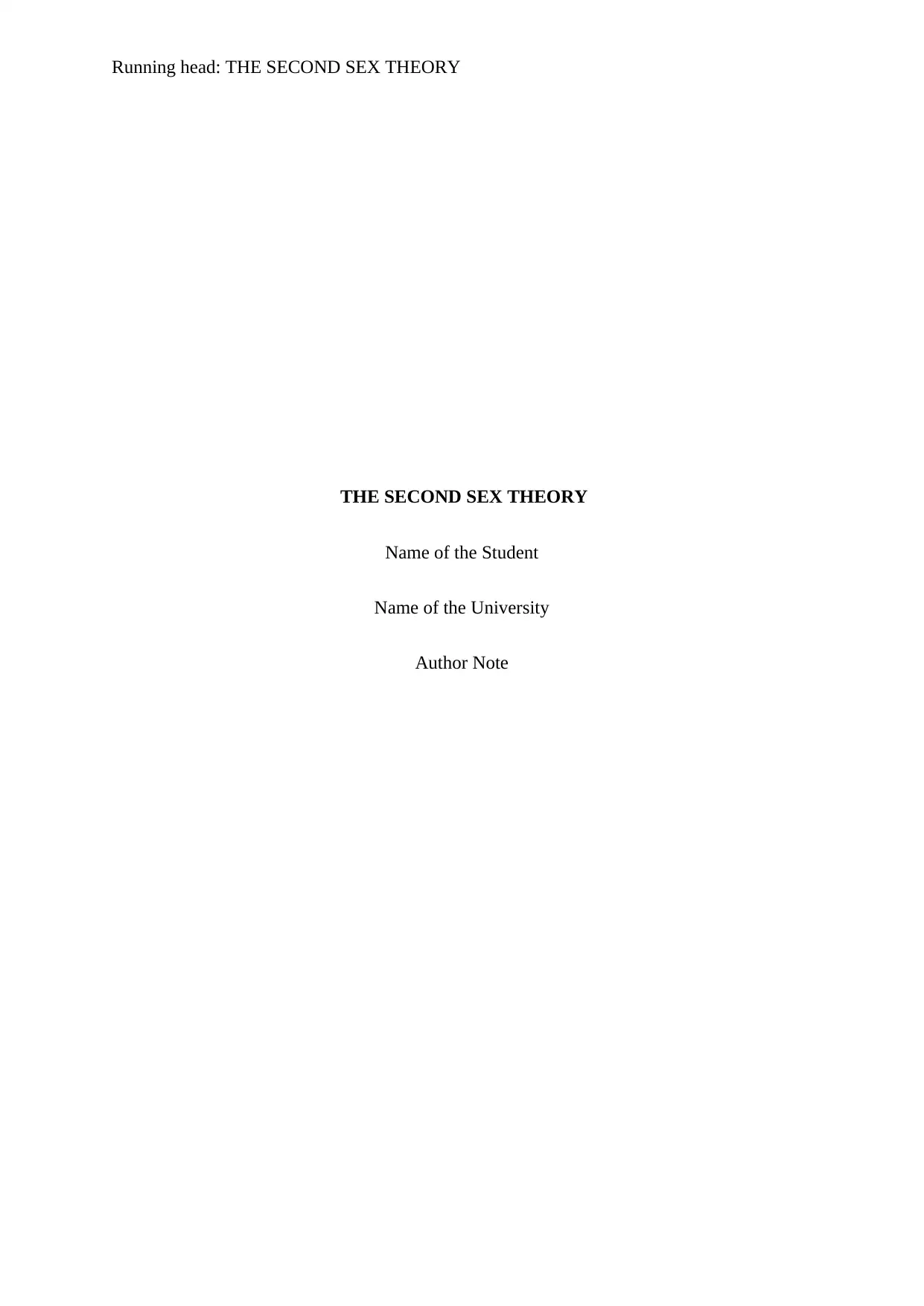
Running head: THE SECOND SEX THEORY
THE SECOND SEX THEORY
Name of the Student
Name of the University
Author Note
THE SECOND SEX THEORY
Name of the Student
Name of the University
Author Note
Secure Best Marks with AI Grader
Need help grading? Try our AI Grader for instant feedback on your assignments.
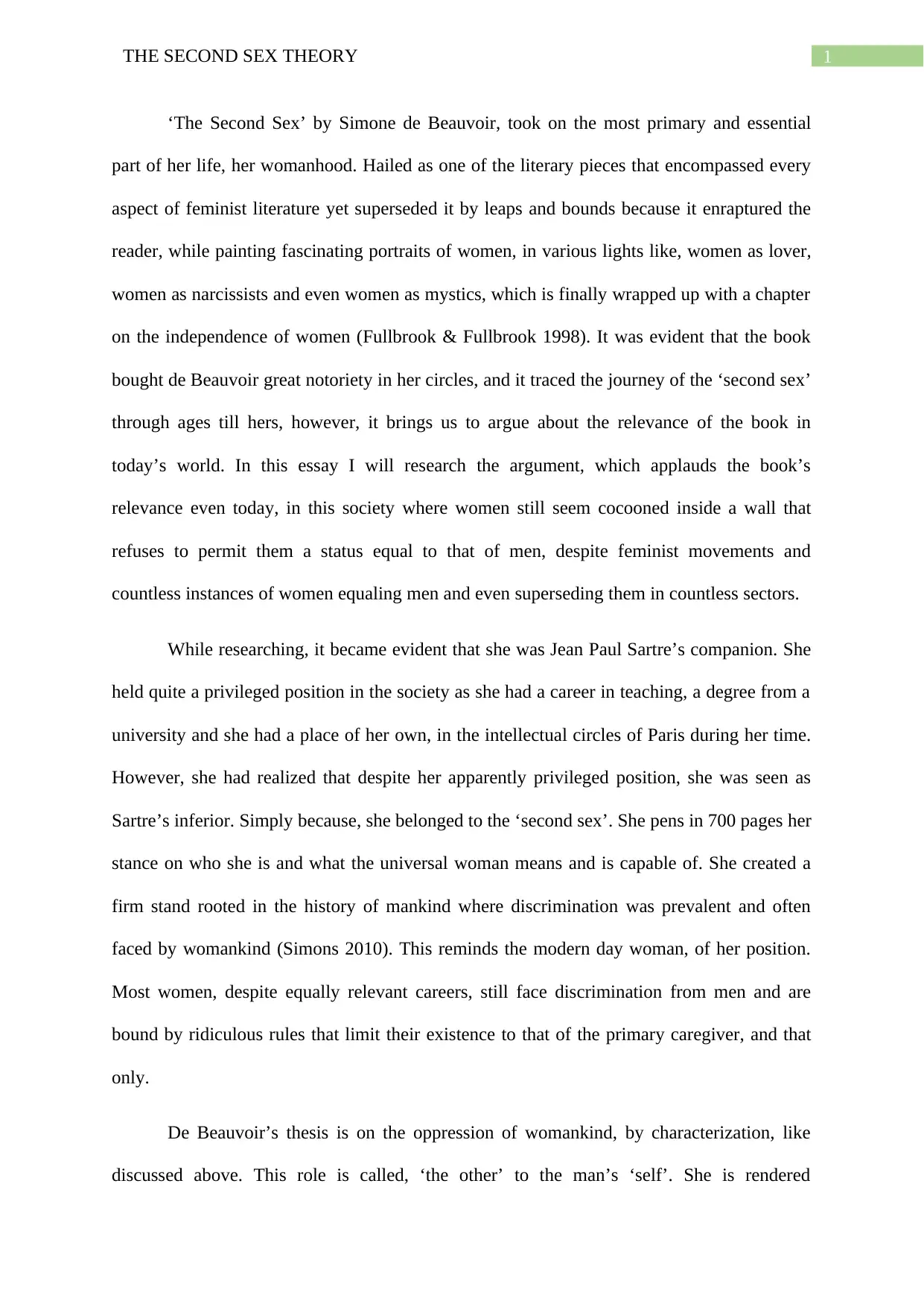
1THE SECOND SEX THEORY
‘The Second Sex’ by Simone de Beauvoir, took on the most primary and essential
part of her life, her womanhood. Hailed as one of the literary pieces that encompassed every
aspect of feminist literature yet superseded it by leaps and bounds because it enraptured the
reader, while painting fascinating portraits of women, in various lights like, women as lover,
women as narcissists and even women as mystics, which is finally wrapped up with a chapter
on the independence of women (Fullbrook & Fullbrook 1998). It was evident that the book
bought de Beauvoir great notoriety in her circles, and it traced the journey of the ‘second sex’
through ages till hers, however, it brings us to argue about the relevance of the book in
today’s world. In this essay I will research the argument, which applauds the book’s
relevance even today, in this society where women still seem cocooned inside a wall that
refuses to permit them a status equal to that of men, despite feminist movements and
countless instances of women equaling men and even superseding them in countless sectors.
While researching, it became evident that she was Jean Paul Sartre’s companion. She
held quite a privileged position in the society as she had a career in teaching, a degree from a
university and she had a place of her own, in the intellectual circles of Paris during her time.
However, she had realized that despite her apparently privileged position, she was seen as
Sartre’s inferior. Simply because, she belonged to the ‘second sex’. She pens in 700 pages her
stance on who she is and what the universal woman means and is capable of. She created a
firm stand rooted in the history of mankind where discrimination was prevalent and often
faced by womankind (Simons 2010). This reminds the modern day woman, of her position.
Most women, despite equally relevant careers, still face discrimination from men and are
bound by ridiculous rules that limit their existence to that of the primary caregiver, and that
only.
De Beauvoir’s thesis is on the oppression of womankind, by characterization, like
discussed above. This role is called, ‘the other’ to the man’s ‘self’. She is rendered
‘The Second Sex’ by Simone de Beauvoir, took on the most primary and essential
part of her life, her womanhood. Hailed as one of the literary pieces that encompassed every
aspect of feminist literature yet superseded it by leaps and bounds because it enraptured the
reader, while painting fascinating portraits of women, in various lights like, women as lover,
women as narcissists and even women as mystics, which is finally wrapped up with a chapter
on the independence of women (Fullbrook & Fullbrook 1998). It was evident that the book
bought de Beauvoir great notoriety in her circles, and it traced the journey of the ‘second sex’
through ages till hers, however, it brings us to argue about the relevance of the book in
today’s world. In this essay I will research the argument, which applauds the book’s
relevance even today, in this society where women still seem cocooned inside a wall that
refuses to permit them a status equal to that of men, despite feminist movements and
countless instances of women equaling men and even superseding them in countless sectors.
While researching, it became evident that she was Jean Paul Sartre’s companion. She
held quite a privileged position in the society as she had a career in teaching, a degree from a
university and she had a place of her own, in the intellectual circles of Paris during her time.
However, she had realized that despite her apparently privileged position, she was seen as
Sartre’s inferior. Simply because, she belonged to the ‘second sex’. She pens in 700 pages her
stance on who she is and what the universal woman means and is capable of. She created a
firm stand rooted in the history of mankind where discrimination was prevalent and often
faced by womankind (Simons 2010). This reminds the modern day woman, of her position.
Most women, despite equally relevant careers, still face discrimination from men and are
bound by ridiculous rules that limit their existence to that of the primary caregiver, and that
only.
De Beauvoir’s thesis is on the oppression of womankind, by characterization, like
discussed above. This role is called, ‘the other’ to the man’s ‘self’. She is rendered
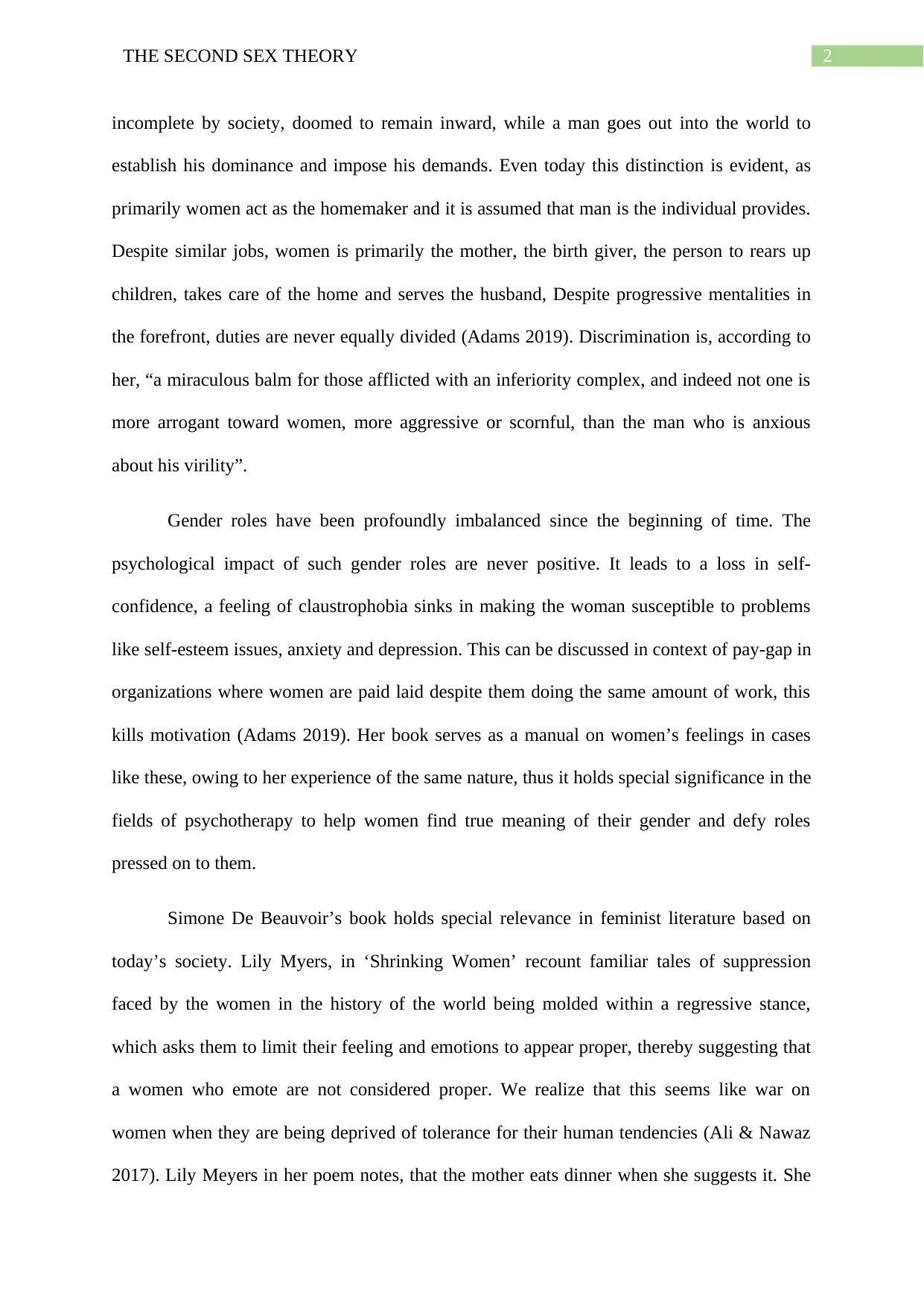
2THE SECOND SEX THEORY
incomplete by society, doomed to remain inward, while a man goes out into the world to
establish his dominance and impose his demands. Even today this distinction is evident, as
primarily women act as the homemaker and it is assumed that man is the individual provides.
Despite similar jobs, women is primarily the mother, the birth giver, the person to rears up
children, takes care of the home and serves the husband, Despite progressive mentalities in
the forefront, duties are never equally divided (Adams 2019). Discrimination is, according to
her, “a miraculous balm for those afflicted with an inferiority complex, and indeed not one is
more arrogant toward women, more aggressive or scornful, than the man who is anxious
about his virility”.
Gender roles have been profoundly imbalanced since the beginning of time. The
psychological impact of such gender roles are never positive. It leads to a loss in self-
confidence, a feeling of claustrophobia sinks in making the woman susceptible to problems
like self-esteem issues, anxiety and depression. This can be discussed in context of pay-gap in
organizations where women are paid laid despite them doing the same amount of work, this
kills motivation (Adams 2019). Her book serves as a manual on women’s feelings in cases
like these, owing to her experience of the same nature, thus it holds special significance in the
fields of psychotherapy to help women find true meaning of their gender and defy roles
pressed on to them.
Simone De Beauvoir’s book holds special relevance in feminist literature based on
today’s society. Lily Myers, in ‘Shrinking Women’ recount familiar tales of suppression
faced by the women in the history of the world being molded within a regressive stance,
which asks them to limit their feeling and emotions to appear proper, thereby suggesting that
a women who emote are not considered proper. We realize that this seems like war on
women when they are being deprived of tolerance for their human tendencies (Ali & Nawaz
2017). Lily Meyers in her poem notes, that the mother eats dinner when she suggests it. She
incomplete by society, doomed to remain inward, while a man goes out into the world to
establish his dominance and impose his demands. Even today this distinction is evident, as
primarily women act as the homemaker and it is assumed that man is the individual provides.
Despite similar jobs, women is primarily the mother, the birth giver, the person to rears up
children, takes care of the home and serves the husband, Despite progressive mentalities in
the forefront, duties are never equally divided (Adams 2019). Discrimination is, according to
her, “a miraculous balm for those afflicted with an inferiority complex, and indeed not one is
more arrogant toward women, more aggressive or scornful, than the man who is anxious
about his virility”.
Gender roles have been profoundly imbalanced since the beginning of time. The
psychological impact of such gender roles are never positive. It leads to a loss in self-
confidence, a feeling of claustrophobia sinks in making the woman susceptible to problems
like self-esteem issues, anxiety and depression. This can be discussed in context of pay-gap in
organizations where women are paid laid despite them doing the same amount of work, this
kills motivation (Adams 2019). Her book serves as a manual on women’s feelings in cases
like these, owing to her experience of the same nature, thus it holds special significance in the
fields of psychotherapy to help women find true meaning of their gender and defy roles
pressed on to them.
Simone De Beauvoir’s book holds special relevance in feminist literature based on
today’s society. Lily Myers, in ‘Shrinking Women’ recount familiar tales of suppression
faced by the women in the history of the world being molded within a regressive stance,
which asks them to limit their feeling and emotions to appear proper, thereby suggesting that
a women who emote are not considered proper. We realize that this seems like war on
women when they are being deprived of tolerance for their human tendencies (Ali & Nawaz
2017). Lily Meyers in her poem notes, that the mother eats dinner when she suggests it. She
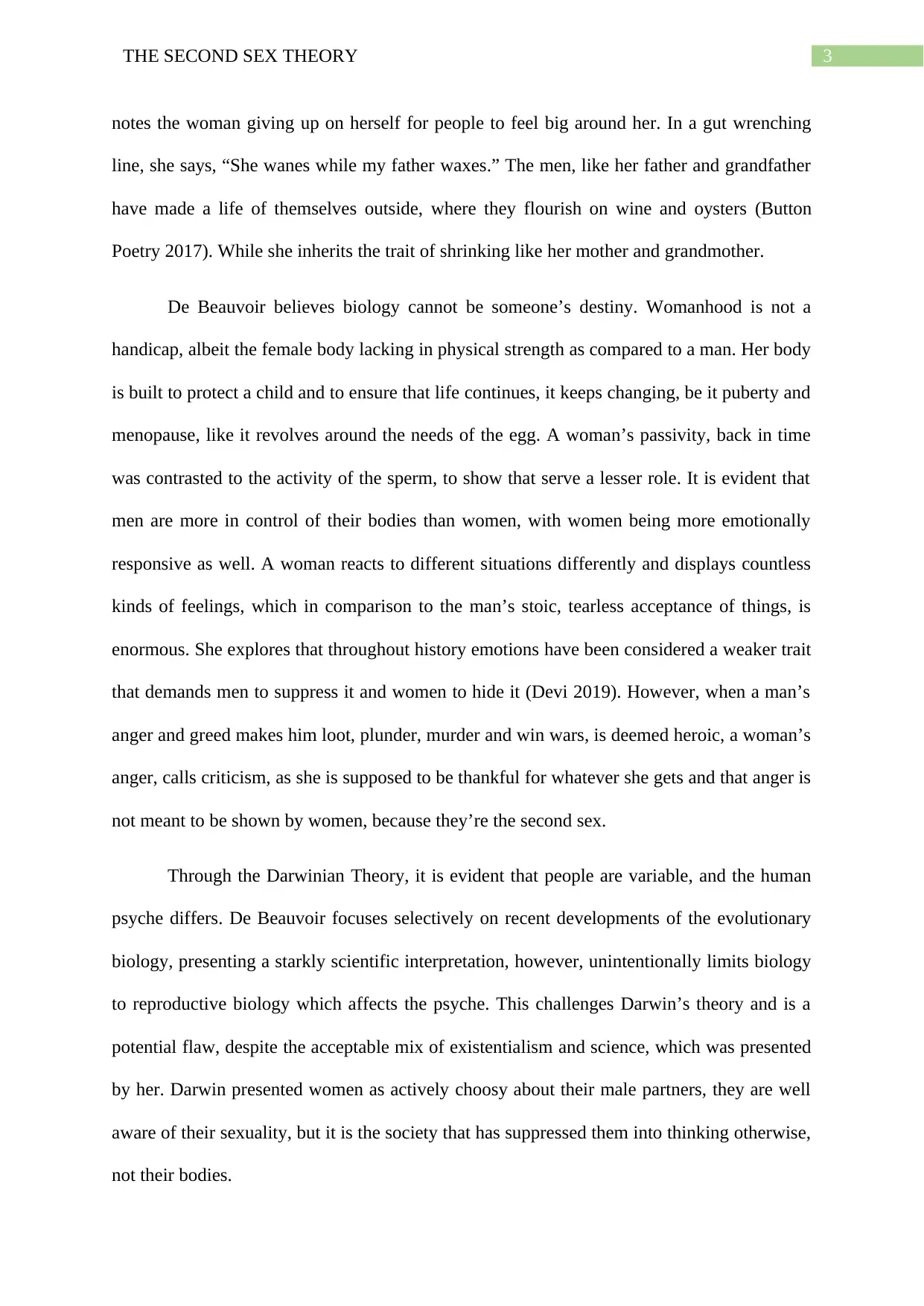
3THE SECOND SEX THEORY
notes the woman giving up on herself for people to feel big around her. In a gut wrenching
line, she says, “She wanes while my father waxes.” The men, like her father and grandfather
have made a life of themselves outside, where they flourish on wine and oysters (Button
Poetry 2017). While she inherits the trait of shrinking like her mother and grandmother.
De Beauvoir believes biology cannot be someone’s destiny. Womanhood is not a
handicap, albeit the female body lacking in physical strength as compared to a man. Her body
is built to protect a child and to ensure that life continues, it keeps changing, be it puberty and
menopause, like it revolves around the needs of the egg. A woman’s passivity, back in time
was contrasted to the activity of the sperm, to show that serve a lesser role. It is evident that
men are more in control of their bodies than women, with women being more emotionally
responsive as well. A woman reacts to different situations differently and displays countless
kinds of feelings, which in comparison to the man’s stoic, tearless acceptance of things, is
enormous. She explores that throughout history emotions have been considered a weaker trait
that demands men to suppress it and women to hide it (Devi 2019). However, when a man’s
anger and greed makes him loot, plunder, murder and win wars, is deemed heroic, a woman’s
anger, calls criticism, as she is supposed to be thankful for whatever she gets and that anger is
not meant to be shown by women, because they’re the second sex.
Through the Darwinian Theory, it is evident that people are variable, and the human
psyche differs. De Beauvoir focuses selectively on recent developments of the evolutionary
biology, presenting a starkly scientific interpretation, however, unintentionally limits biology
to reproductive biology which affects the psyche. This challenges Darwin’s theory and is a
potential flaw, despite the acceptable mix of existentialism and science, which was presented
by her. Darwin presented women as actively choosy about their male partners, they are well
aware of their sexuality, but it is the society that has suppressed them into thinking otherwise,
not their bodies.
notes the woman giving up on herself for people to feel big around her. In a gut wrenching
line, she says, “She wanes while my father waxes.” The men, like her father and grandfather
have made a life of themselves outside, where they flourish on wine and oysters (Button
Poetry 2017). While she inherits the trait of shrinking like her mother and grandmother.
De Beauvoir believes biology cannot be someone’s destiny. Womanhood is not a
handicap, albeit the female body lacking in physical strength as compared to a man. Her body
is built to protect a child and to ensure that life continues, it keeps changing, be it puberty and
menopause, like it revolves around the needs of the egg. A woman’s passivity, back in time
was contrasted to the activity of the sperm, to show that serve a lesser role. It is evident that
men are more in control of their bodies than women, with women being more emotionally
responsive as well. A woman reacts to different situations differently and displays countless
kinds of feelings, which in comparison to the man’s stoic, tearless acceptance of things, is
enormous. She explores that throughout history emotions have been considered a weaker trait
that demands men to suppress it and women to hide it (Devi 2019). However, when a man’s
anger and greed makes him loot, plunder, murder and win wars, is deemed heroic, a woman’s
anger, calls criticism, as she is supposed to be thankful for whatever she gets and that anger is
not meant to be shown by women, because they’re the second sex.
Through the Darwinian Theory, it is evident that people are variable, and the human
psyche differs. De Beauvoir focuses selectively on recent developments of the evolutionary
biology, presenting a starkly scientific interpretation, however, unintentionally limits biology
to reproductive biology which affects the psyche. This challenges Darwin’s theory and is a
potential flaw, despite the acceptable mix of existentialism and science, which was presented
by her. Darwin presented women as actively choosy about their male partners, they are well
aware of their sexuality, but it is the society that has suppressed them into thinking otherwise,
not their bodies.
Secure Best Marks with AI Grader
Need help grading? Try our AI Grader for instant feedback on your assignments.
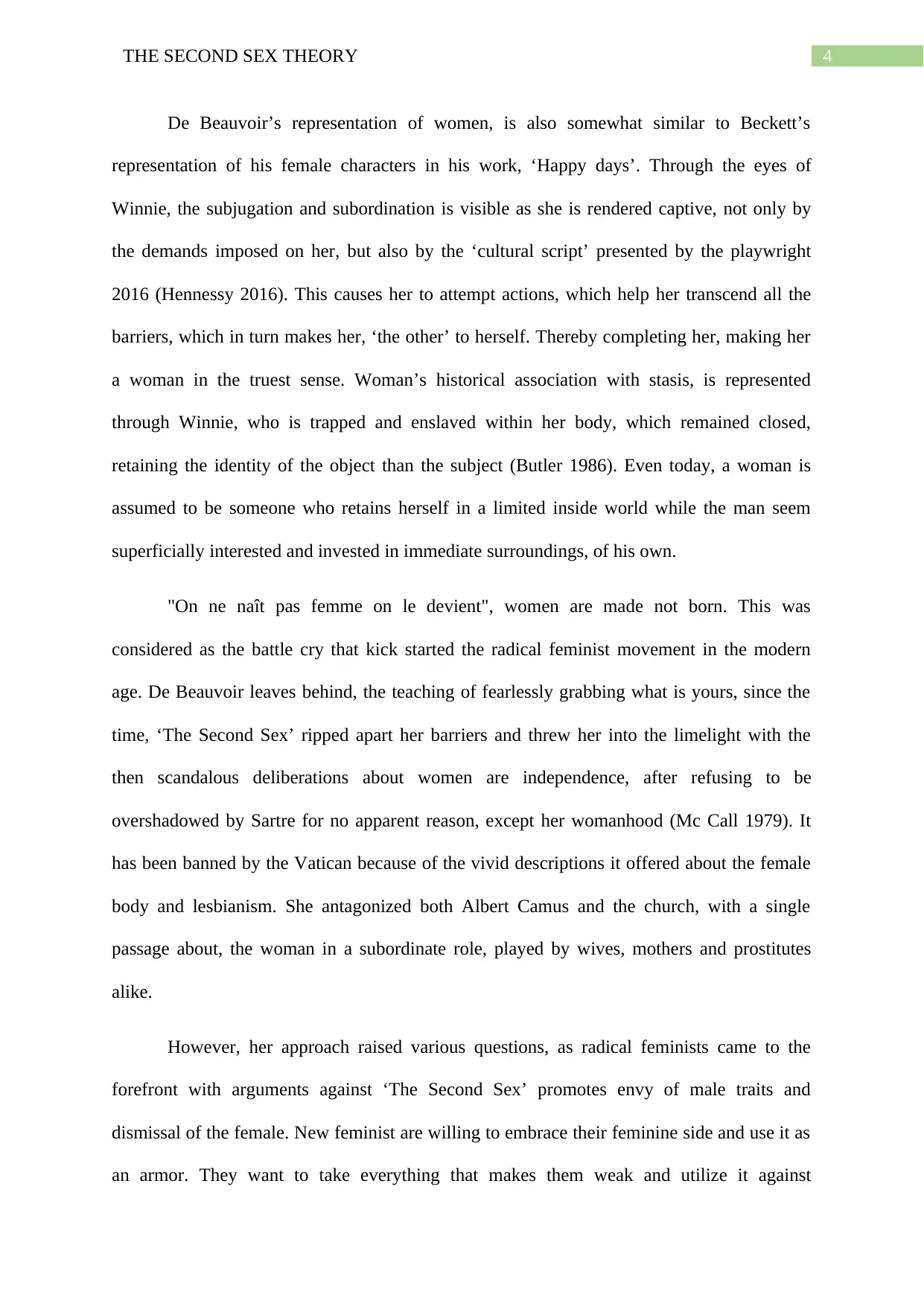
4THE SECOND SEX THEORY
De Beauvoir’s representation of women, is also somewhat similar to Beckett’s
representation of his female characters in his work, ‘Happy days’. Through the eyes of
Winnie, the subjugation and subordination is visible as she is rendered captive, not only by
the demands imposed on her, but also by the ‘cultural script’ presented by the playwright
2016 (Hennessy 2016). This causes her to attempt actions, which help her transcend all the
barriers, which in turn makes her, ‘the other’ to herself. Thereby completing her, making her
a woman in the truest sense. Woman’s historical association with stasis, is represented
through Winnie, who is trapped and enslaved within her body, which remained closed,
retaining the identity of the object than the subject (Butler 1986). Even today, a woman is
assumed to be someone who retains herself in a limited inside world while the man seem
superficially interested and invested in immediate surroundings, of his own.
"On ne naît pas femme on le devient", women are made not born. This was
considered as the battle cry that kick started the radical feminist movement in the modern
age. De Beauvoir leaves behind, the teaching of fearlessly grabbing what is yours, since the
time, ‘The Second Sex’ ripped apart her barriers and threw her into the limelight with the
then scandalous deliberations about women are independence, after refusing to be
overshadowed by Sartre for no apparent reason, except her womanhood (Mc Call 1979). It
has been banned by the Vatican because of the vivid descriptions it offered about the female
body and lesbianism. She antagonized both Albert Camus and the church, with a single
passage about, the woman in a subordinate role, played by wives, mothers and prostitutes
alike.
However, her approach raised various questions, as radical feminists came to the
forefront with arguments against ‘The Second Sex’ promotes envy of male traits and
dismissal of the female. New feminist are willing to embrace their feminine side and use it as
an armor. They want to take everything that makes them weak and utilize it against
De Beauvoir’s representation of women, is also somewhat similar to Beckett’s
representation of his female characters in his work, ‘Happy days’. Through the eyes of
Winnie, the subjugation and subordination is visible as she is rendered captive, not only by
the demands imposed on her, but also by the ‘cultural script’ presented by the playwright
2016 (Hennessy 2016). This causes her to attempt actions, which help her transcend all the
barriers, which in turn makes her, ‘the other’ to herself. Thereby completing her, making her
a woman in the truest sense. Woman’s historical association with stasis, is represented
through Winnie, who is trapped and enslaved within her body, which remained closed,
retaining the identity of the object than the subject (Butler 1986). Even today, a woman is
assumed to be someone who retains herself in a limited inside world while the man seem
superficially interested and invested in immediate surroundings, of his own.
"On ne naît pas femme on le devient", women are made not born. This was
considered as the battle cry that kick started the radical feminist movement in the modern
age. De Beauvoir leaves behind, the teaching of fearlessly grabbing what is yours, since the
time, ‘The Second Sex’ ripped apart her barriers and threw her into the limelight with the
then scandalous deliberations about women are independence, after refusing to be
overshadowed by Sartre for no apparent reason, except her womanhood (Mc Call 1979). It
has been banned by the Vatican because of the vivid descriptions it offered about the female
body and lesbianism. She antagonized both Albert Camus and the church, with a single
passage about, the woman in a subordinate role, played by wives, mothers and prostitutes
alike.
However, her approach raised various questions, as radical feminists came to the
forefront with arguments against ‘The Second Sex’ promotes envy of male traits and
dismissal of the female. New feminist are willing to embrace their feminine side and use it as
an armor. They want to take everything that makes them weak and utilize it against
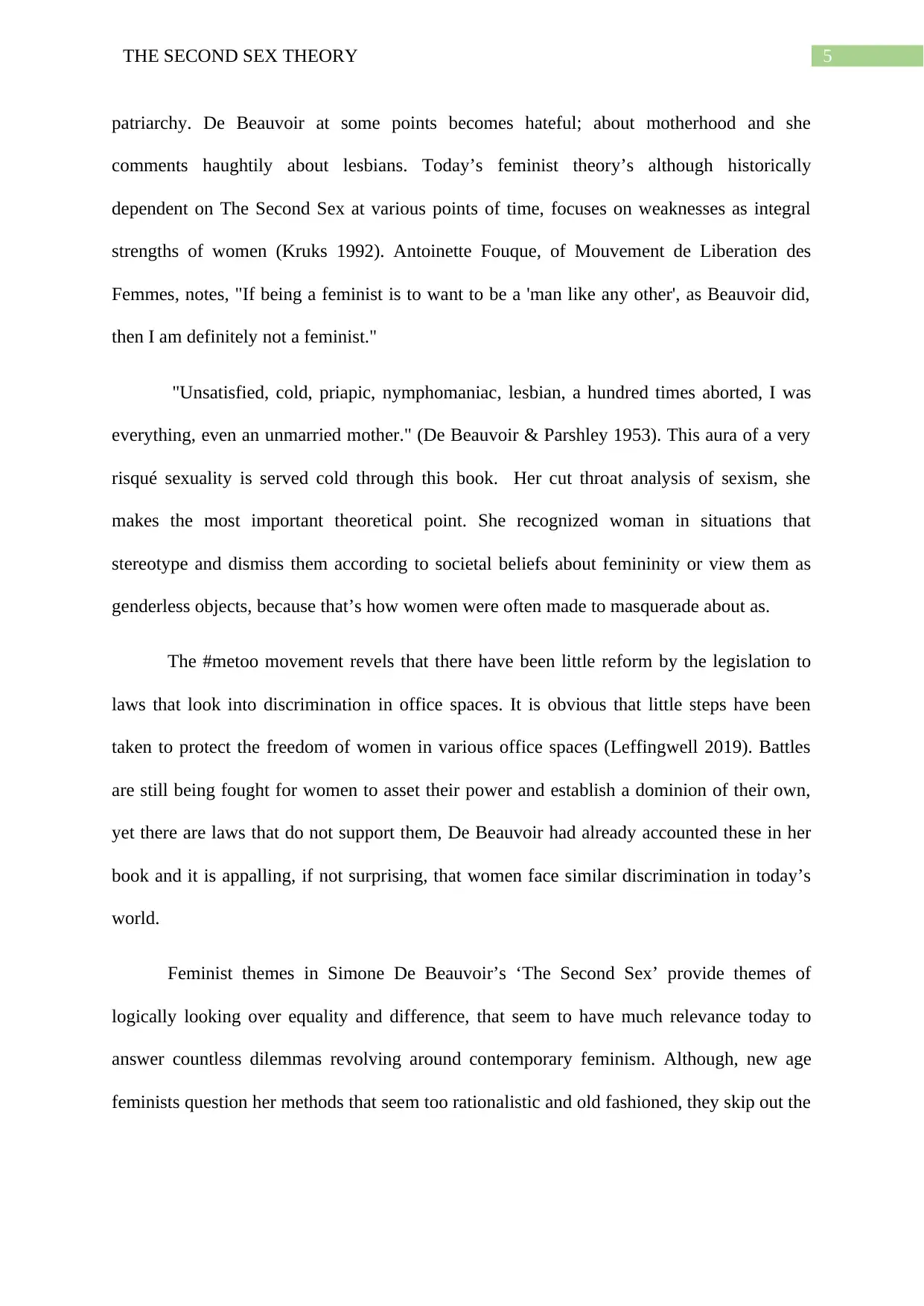
5THE SECOND SEX THEORY
patriarchy. De Beauvoir at some points becomes hateful; about motherhood and she
comments haughtily about lesbians. Today’s feminist theory’s although historically
dependent on The Second Sex at various points of time, focuses on weaknesses as integral
strengths of women (Kruks 1992). Antoinette Fouque, of Mouvement de Liberation des
Femmes, notes, "If being a feminist is to want to be a 'man like any other', as Beauvoir did,
then I am definitely not a feminist."
"Unsatisfied, cold, priapic, nymphomaniac, lesbian, a hundred times aborted, I was
everything, even an unmarried mother." (De Beauvoir & Parshley 1953). This aura of a very
risqué sexuality is served cold through this book. Her cut throat analysis of sexism, she
makes the most important theoretical point. She recognized woman in situations that
stereotype and dismiss them according to societal beliefs about femininity or view them as
genderless objects, because that’s how women were often made to masquerade about as.
The #metoo movement revels that there have been little reform by the legislation to
laws that look into discrimination in office spaces. It is obvious that little steps have been
taken to protect the freedom of women in various office spaces (Leffingwell 2019). Battles
are still being fought for women to asset their power and establish a dominion of their own,
yet there are laws that do not support them, De Beauvoir had already accounted these in her
book and it is appalling, if not surprising, that women face similar discrimination in today’s
world.
Feminist themes in Simone De Beauvoir’s ‘The Second Sex’ provide themes of
logically looking over equality and difference, that seem to have much relevance today to
answer countless dilemmas revolving around contemporary feminism. Although, new age
feminists question her methods that seem too rationalistic and old fashioned, they skip out the
patriarchy. De Beauvoir at some points becomes hateful; about motherhood and she
comments haughtily about lesbians. Today’s feminist theory’s although historically
dependent on The Second Sex at various points of time, focuses on weaknesses as integral
strengths of women (Kruks 1992). Antoinette Fouque, of Mouvement de Liberation des
Femmes, notes, "If being a feminist is to want to be a 'man like any other', as Beauvoir did,
then I am definitely not a feminist."
"Unsatisfied, cold, priapic, nymphomaniac, lesbian, a hundred times aborted, I was
everything, even an unmarried mother." (De Beauvoir & Parshley 1953). This aura of a very
risqué sexuality is served cold through this book. Her cut throat analysis of sexism, she
makes the most important theoretical point. She recognized woman in situations that
stereotype and dismiss them according to societal beliefs about femininity or view them as
genderless objects, because that’s how women were often made to masquerade about as.
The #metoo movement revels that there have been little reform by the legislation to
laws that look into discrimination in office spaces. It is obvious that little steps have been
taken to protect the freedom of women in various office spaces (Leffingwell 2019). Battles
are still being fought for women to asset their power and establish a dominion of their own,
yet there are laws that do not support them, De Beauvoir had already accounted these in her
book and it is appalling, if not surprising, that women face similar discrimination in today’s
world.
Feminist themes in Simone De Beauvoir’s ‘The Second Sex’ provide themes of
logically looking over equality and difference, that seem to have much relevance today to
answer countless dilemmas revolving around contemporary feminism. Although, new age
feminists question her methods that seem too rationalistic and old fashioned, they skip out the
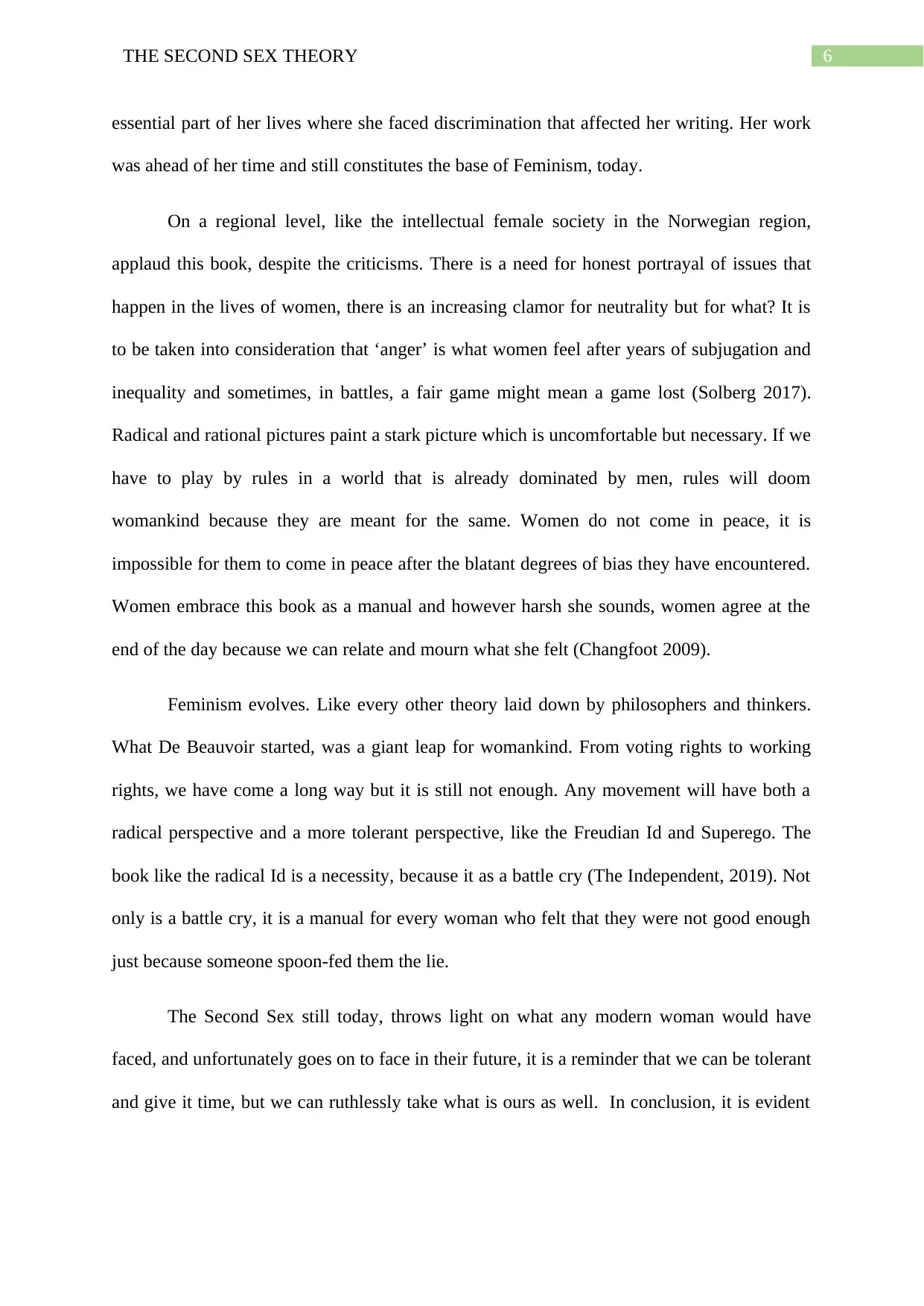
6THE SECOND SEX THEORY
essential part of her lives where she faced discrimination that affected her writing. Her work
was ahead of her time and still constitutes the base of Feminism, today.
On a regional level, like the intellectual female society in the Norwegian region,
applaud this book, despite the criticisms. There is a need for honest portrayal of issues that
happen in the lives of women, there is an increasing clamor for neutrality but for what? It is
to be taken into consideration that ‘anger’ is what women feel after years of subjugation and
inequality and sometimes, in battles, a fair game might mean a game lost (Solberg 2017).
Radical and rational pictures paint a stark picture which is uncomfortable but necessary. If we
have to play by rules in a world that is already dominated by men, rules will doom
womankind because they are meant for the same. Women do not come in peace, it is
impossible for them to come in peace after the blatant degrees of bias they have encountered.
Women embrace this book as a manual and however harsh she sounds, women agree at the
end of the day because we can relate and mourn what she felt (Changfoot 2009).
Feminism evolves. Like every other theory laid down by philosophers and thinkers.
What De Beauvoir started, was a giant leap for womankind. From voting rights to working
rights, we have come a long way but it is still not enough. Any movement will have both a
radical perspective and a more tolerant perspective, like the Freudian Id and Superego. The
book like the radical Id is a necessity, because it as a battle cry (The Independent, 2019). Not
only is a battle cry, it is a manual for every woman who felt that they were not good enough
just because someone spoon-fed them the lie.
The Second Sex still today, throws light on what any modern woman would have
faced, and unfortunately goes on to face in their future, it is a reminder that we can be tolerant
and give it time, but we can ruthlessly take what is ours as well. In conclusion, it is evident
essential part of her lives where she faced discrimination that affected her writing. Her work
was ahead of her time and still constitutes the base of Feminism, today.
On a regional level, like the intellectual female society in the Norwegian region,
applaud this book, despite the criticisms. There is a need for honest portrayal of issues that
happen in the lives of women, there is an increasing clamor for neutrality but for what? It is
to be taken into consideration that ‘anger’ is what women feel after years of subjugation and
inequality and sometimes, in battles, a fair game might mean a game lost (Solberg 2017).
Radical and rational pictures paint a stark picture which is uncomfortable but necessary. If we
have to play by rules in a world that is already dominated by men, rules will doom
womankind because they are meant for the same. Women do not come in peace, it is
impossible for them to come in peace after the blatant degrees of bias they have encountered.
Women embrace this book as a manual and however harsh she sounds, women agree at the
end of the day because we can relate and mourn what she felt (Changfoot 2009).
Feminism evolves. Like every other theory laid down by philosophers and thinkers.
What De Beauvoir started, was a giant leap for womankind. From voting rights to working
rights, we have come a long way but it is still not enough. Any movement will have both a
radical perspective and a more tolerant perspective, like the Freudian Id and Superego. The
book like the radical Id is a necessity, because it as a battle cry (The Independent, 2019). Not
only is a battle cry, it is a manual for every woman who felt that they were not good enough
just because someone spoon-fed them the lie.
The Second Sex still today, throws light on what any modern woman would have
faced, and unfortunately goes on to face in their future, it is a reminder that we can be tolerant
and give it time, but we can ruthlessly take what is ours as well. In conclusion, it is evident
Paraphrase This Document
Need a fresh take? Get an instant paraphrase of this document with our AI Paraphraser
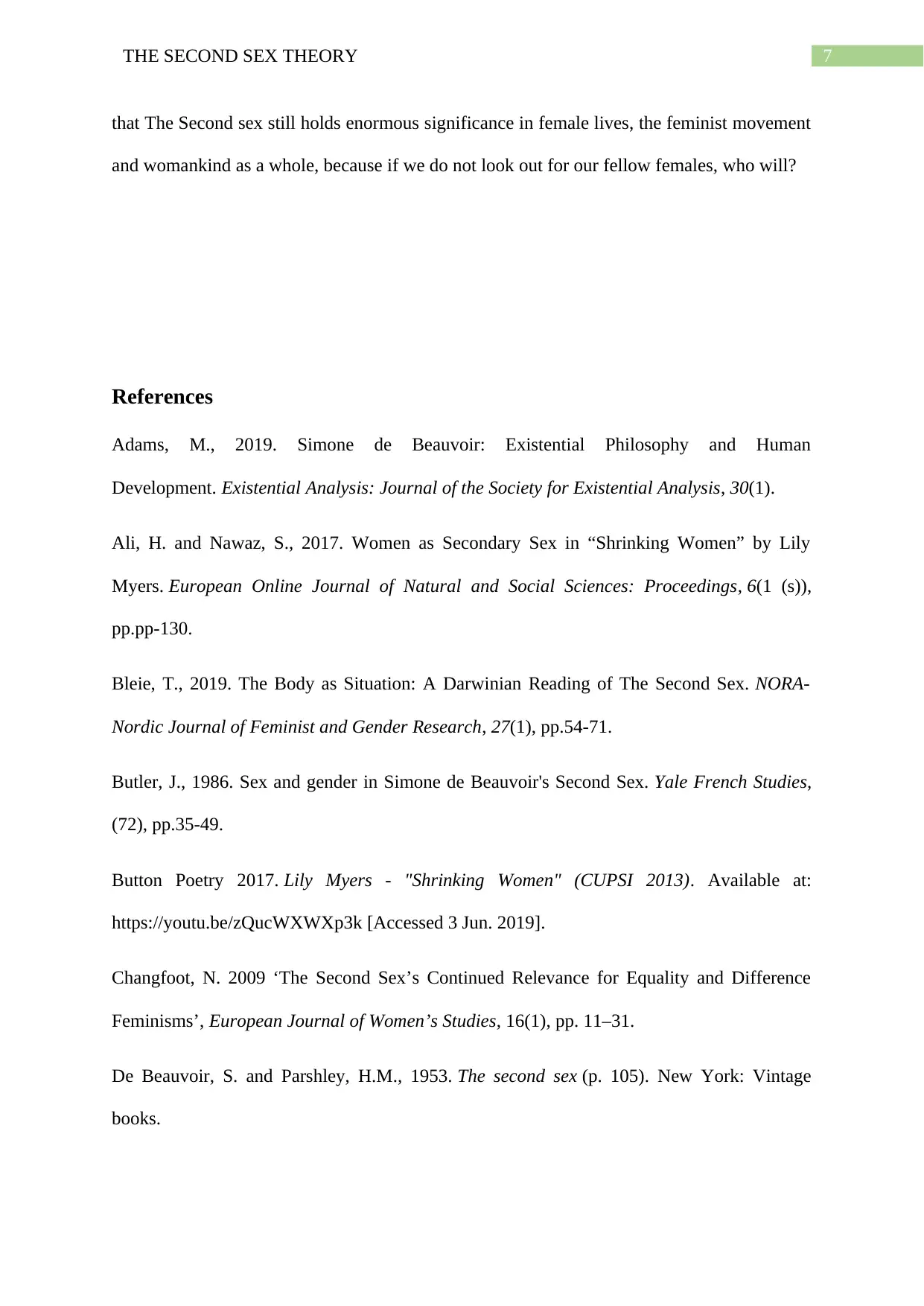
7THE SECOND SEX THEORY
that The Second sex still holds enormous significance in female lives, the feminist movement
and womankind as a whole, because if we do not look out for our fellow females, who will?
References
Adams, M., 2019. Simone de Beauvoir: Existential Philosophy and Human
Development. Existential Analysis: Journal of the Society for Existential Analysis, 30(1).
Ali, H. and Nawaz, S., 2017. Women as Secondary Sex in “Shrinking Women” by Lily
Myers. European Online Journal of Natural and Social Sciences: Proceedings, 6(1 (s)),
pp.pp-130.
Bleie, T., 2019. The Body as Situation: A Darwinian Reading of The Second Sex. NORA-
Nordic Journal of Feminist and Gender Research, 27(1), pp.54-71.
Butler, J., 1986. Sex and gender in Simone de Beauvoir's Second Sex. Yale French Studies,
(72), pp.35-49.
Button Poetry 2017. Lily Myers - "Shrinking Women" (CUPSI 2013). Available at:
https://youtu.be/zQucWXWXp3k [Accessed 3 Jun. 2019].
Changfoot, N. 2009 ‘The Second Sex’s Continued Relevance for Equality and Difference
Feminisms’, European Journal of Women’s Studies, 16(1), pp. 11–31.
De Beauvoir, S. and Parshley, H.M., 1953. The second sex (p. 105). New York: Vintage
books.
that The Second sex still holds enormous significance in female lives, the feminist movement
and womankind as a whole, because if we do not look out for our fellow females, who will?
References
Adams, M., 2019. Simone de Beauvoir: Existential Philosophy and Human
Development. Existential Analysis: Journal of the Society for Existential Analysis, 30(1).
Ali, H. and Nawaz, S., 2017. Women as Secondary Sex in “Shrinking Women” by Lily
Myers. European Online Journal of Natural and Social Sciences: Proceedings, 6(1 (s)),
pp.pp-130.
Bleie, T., 2019. The Body as Situation: A Darwinian Reading of The Second Sex. NORA-
Nordic Journal of Feminist and Gender Research, 27(1), pp.54-71.
Butler, J., 1986. Sex and gender in Simone de Beauvoir's Second Sex. Yale French Studies,
(72), pp.35-49.
Button Poetry 2017. Lily Myers - "Shrinking Women" (CUPSI 2013). Available at:
https://youtu.be/zQucWXWXp3k [Accessed 3 Jun. 2019].
Changfoot, N. 2009 ‘The Second Sex’s Continued Relevance for Equality and Difference
Feminisms’, European Journal of Women’s Studies, 16(1), pp. 11–31.
De Beauvoir, S. and Parshley, H.M., 1953. The second sex (p. 105). New York: Vintage
books.
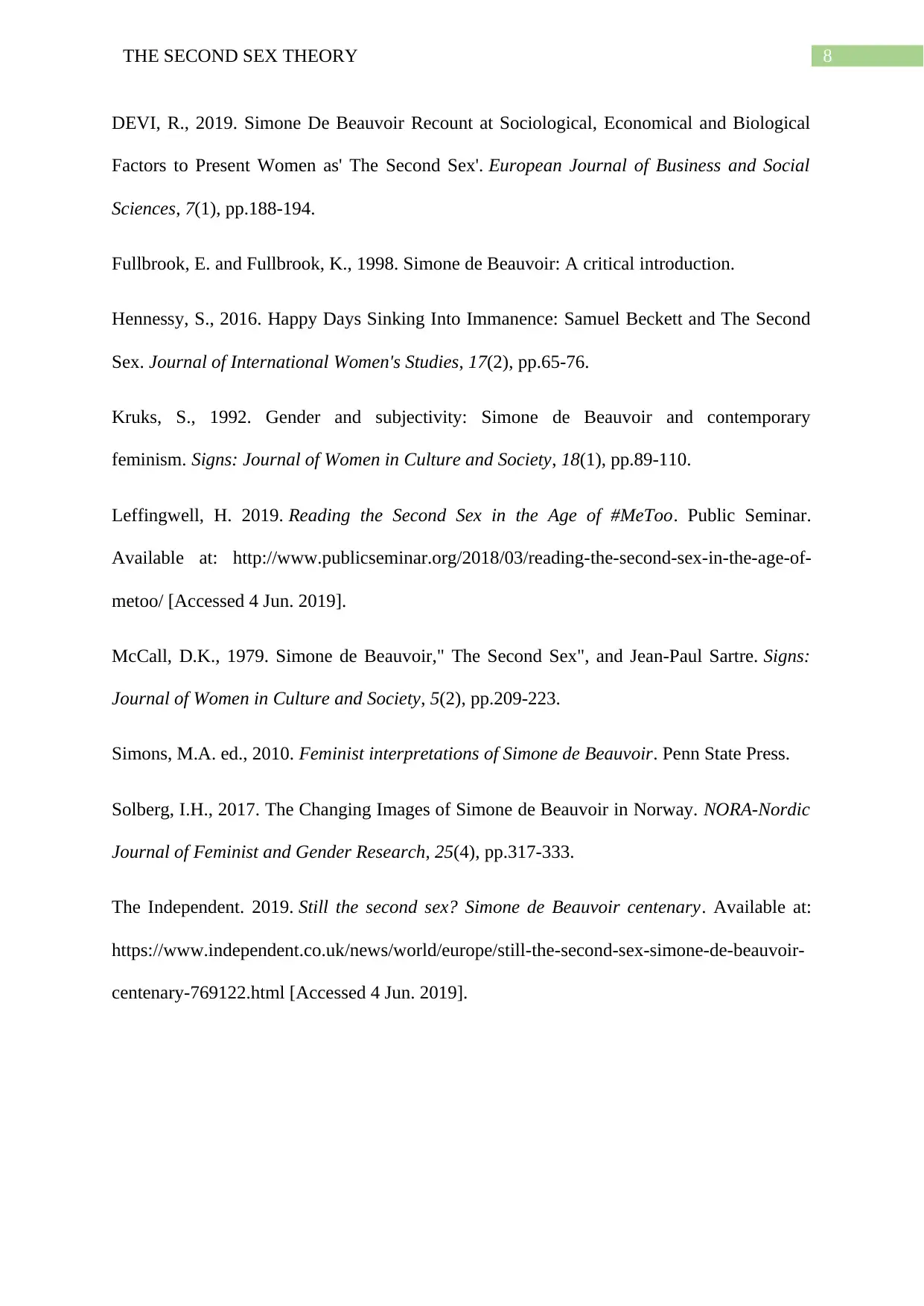
8THE SECOND SEX THEORY
DEVI, R., 2019. Simone De Beauvoir Recount at Sociological, Economical and Biological
Factors to Present Women as' The Second Sex'. European Journal of Business and Social
Sciences, 7(1), pp.188-194.
Fullbrook, E. and Fullbrook, K., 1998. Simone de Beauvoir: A critical introduction.
Hennessy, S., 2016. Happy Days Sinking Into Immanence: Samuel Beckett and The Second
Sex. Journal of International Women's Studies, 17(2), pp.65-76.
Kruks, S., 1992. Gender and subjectivity: Simone de Beauvoir and contemporary
feminism. Signs: Journal of Women in Culture and Society, 18(1), pp.89-110.
Leffingwell, H. 2019. Reading the Second Sex in the Age of #MeToo. Public Seminar.
Available at: http://www.publicseminar.org/2018/03/reading-the-second-sex-in-the-age-of-
metoo/ [Accessed 4 Jun. 2019].
McCall, D.K., 1979. Simone de Beauvoir," The Second Sex", and Jean-Paul Sartre. Signs:
Journal of Women in Culture and Society, 5(2), pp.209-223.
Simons, M.A. ed., 2010. Feminist interpretations of Simone de Beauvoir. Penn State Press.
Solberg, I.H., 2017. The Changing Images of Simone de Beauvoir in Norway. NORA-Nordic
Journal of Feminist and Gender Research, 25(4), pp.317-333.
The Independent. 2019. Still the second sex? Simone de Beauvoir centenary. Available at:
https://www.independent.co.uk/news/world/europe/still-the-second-sex-simone-de-beauvoir-
centenary-769122.html [Accessed 4 Jun. 2019].
DEVI, R., 2019. Simone De Beauvoir Recount at Sociological, Economical and Biological
Factors to Present Women as' The Second Sex'. European Journal of Business and Social
Sciences, 7(1), pp.188-194.
Fullbrook, E. and Fullbrook, K., 1998. Simone de Beauvoir: A critical introduction.
Hennessy, S., 2016. Happy Days Sinking Into Immanence: Samuel Beckett and The Second
Sex. Journal of International Women's Studies, 17(2), pp.65-76.
Kruks, S., 1992. Gender and subjectivity: Simone de Beauvoir and contemporary
feminism. Signs: Journal of Women in Culture and Society, 18(1), pp.89-110.
Leffingwell, H. 2019. Reading the Second Sex in the Age of #MeToo. Public Seminar.
Available at: http://www.publicseminar.org/2018/03/reading-the-second-sex-in-the-age-of-
metoo/ [Accessed 4 Jun. 2019].
McCall, D.K., 1979. Simone de Beauvoir," The Second Sex", and Jean-Paul Sartre. Signs:
Journal of Women in Culture and Society, 5(2), pp.209-223.
Simons, M.A. ed., 2010. Feminist interpretations of Simone de Beauvoir. Penn State Press.
Solberg, I.H., 2017. The Changing Images of Simone de Beauvoir in Norway. NORA-Nordic
Journal of Feminist and Gender Research, 25(4), pp.317-333.
The Independent. 2019. Still the second sex? Simone de Beauvoir centenary. Available at:
https://www.independent.co.uk/news/world/europe/still-the-second-sex-simone-de-beauvoir-
centenary-769122.html [Accessed 4 Jun. 2019].
1 out of 9
Related Documents
Your All-in-One AI-Powered Toolkit for Academic Success.
+13062052269
info@desklib.com
Available 24*7 on WhatsApp / Email
![[object Object]](/_next/static/media/star-bottom.7253800d.svg)
Unlock your academic potential
© 2024 | Zucol Services PVT LTD | All rights reserved.





